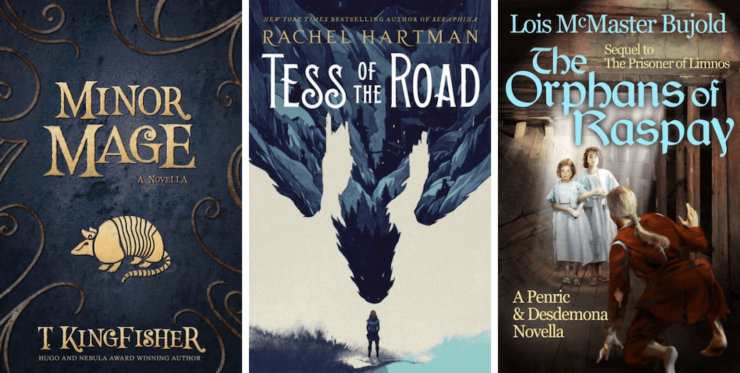Last column out, I mentioned that I woke up one day to discover I hated every book I read. Shortly afterwards, I made a resolution, at least for now, to only read books that—to borrow a phrase—”sparked joy” and left me feeling delighted with my experience of the narrative. (Or at the very least, pleased.) This has had the beneficial effect of removing a significant number of volumes from my to-be-read shelf.
And increasing my pleasure in reading significantly.
Ursula Vernon’s fiction is always cheering. (Though I understand there’s a forthcoming horror novel that might not be.) The latest of her T. Kingfisher novels and novellas is a short novella called Minor Mage, a brisk, bracing, compassionate and blackly humorous story about a twelve-year-old boy called Oliver, who only knows three spells (one of which is to control his allergy to armadillo dander) and has an armadillo familiar. His village waits until his mother is off visiting and then demands he go to bring back the rain—and Oliver was going to go anyway, so they didn’t have to work themselves up into a mob about it. So begins a quintessentially T. Kingfisher involving being chased by ghouls, a teenage boy who’s afflicted with magic that compels him to make musical instruments from the bones of murder victims, a haunted forest, and Cloud Herders who tend herds of clouds almost exactly like sheep. Quirky, weird, and occasionally dark (see above re: ghouls and murder victims), Minor Mage is an engaging, compelling, and ultimately restorative little novella, and I’m really glad I read it.
I can also say I’m glad I finally got around to reading Rachel Hartman’s award-nominated Tess of the Road, set in the same world (and interacting with some of the same characters) as her Seraphina and Shadow Scale. I’d meant to read it ever since Amal El-Mohtar (I believe) recommended it on Twitter, but it had been sitting on my shelf for a while. I had to overcome my decidedly mixed feelings about Seraphina (mixed-race passing half-dragon oppression specialness with musical talent for extra specialness is, perhaps, the Venn diagram intersection that leaves me least likely to feel in charity with otherwise excellent novels) before I began. Fortunately, Tess of the Road is a very different sort of book. It’s the story of a young woman—the eponymous Tess—who has been very badly hurt (in several different ways but mostly by the patriarchy and by parents who appear to have very thoroughly failed to be good parents to her) and who is very angry. That anger is mostly directed at herself, because she has never been allowed to think that she should be angry at the world—and at the people who have hurt her. The novel is the story of Tess deciding to live, and making herself into the kind of person she wants to live with—on a quest on the open road with her oldest friend, who isn’t human. It’s a novel about growth, responsibility, and discovery. Tess is also very young, and she makes a number of mistakes whose consequences hurt other people, so it’s not all an upward trajectory of growth. But in many ways, it’s a novel about kindness and choices, and about recovering from scars.
I liked it. It has depth.
Lois McMaster Bujold’s Penric novellas are pretty much guaranteed to bring me joy. The latest one is called The Orphans of Raspay, and it’s set about a year after the events of The Prisoner of Limnos. Penric—having settled down with Nikys—is on his way home by sea from a small errand when his ship is taken by pirates and he finds himself thrown in the hold with two young women—girls, really—who were captured by pirates after going in search of their merchant father after the death of their mother. Penric adopts the role of rescuer—a role complicated by the fact that he daren’t reveal that he’s a sorcerer lest the pirates drop him overboard, and by his being blond, well-educated, unusually pretty, and looking ten years younger than his age, making him very attractive to the slave market. And also, once they arrive on the island that’s the pirates’ home base, by the fact that Penric, even with his demon Desdemona to help, can’t sail a sea-going vessel all by himself.
Penric attracts trouble, it seems.
A deeply engaging, enjoyable novella, The Orphans of Raspay makes for a fine continuation to Penric and Desdemona’s adventures, replete with humour and excitement. And setting things on fire. Penric is quite good at setting things on fire.
What are you guys reading lately?
Liz Bourke is a cranky queer person who reads books. She holds a Ph.D in Classics from Trinity College, Dublin. Her first book, Sleeping With Monsters, a collection of reviews and criticism, was published in 2017 by Aqueduct Press. It was a finalist for the 2018 Locus Awards and was nominated for a 2018 Hugo Award in Best Related Work. Find her at her blog, where she’s been known to talk about even more books thanks to her Patreon supporters. Or find her at her Twitter. She supports the work of the Irish Refugee Council, the Transgender Equality Network Ireland, and the Abortion Rights Campaign.










